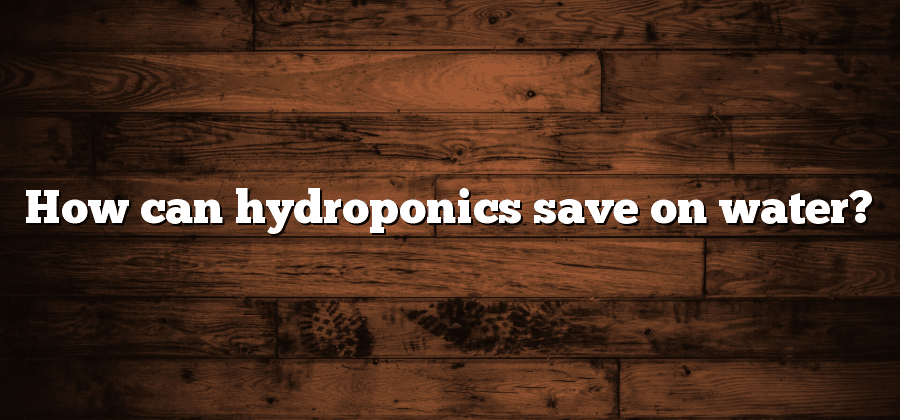The Water-Efficient Nature of Hydroponics
Hydroponics, as a soil-less cultivation method, is renowned for its water efficiency. This system allows plants to grow in a nutrient-rich water solution, providing them with everything they need to thrive without the excessive water usage associated with traditional farming. By eliminating the need for soil, hydroponics utilizes water more effectively, ensuring that each drop serves a purpose in plant growth. This approach has gained attention and popularity for its ability to offer sustainable agriculture solutions in regions with limited water resources.
The water-efficient nature of hydroponics is made possible by the precise control of nutrient delivery. In a hydroponic system, the nutrient solution is carefully dosed and delivered directly to the plant’s root system. This targeted approach reduces water waste by ensuring that the plants receive only the amount of water they require to flourish. By bypassing the soil, which can lead to water loss through evaporation and inefficient absorption, hydroponics minimizes water waste and maximizes efficiency in plant nutrient uptake. As a result, this cultivation method allows for significant water savings, making it an attractive option for those seeking sustainable farming practices.
Reducing Water Waste through Controlled Nutrient Delivery
Hydroponic systems provide an innovative solution for reducing water waste through controlled nutrient delivery. In conventional farming, nutrients are often lost through leaching, resulting in excessive water consumption. However, in hydroponics, **nutrient solutions** are precisely formulated and delivered directly to the plant roots, minimizing nutrient loss and optimizing water usage.
Through the use of **drip irrigation** or **flood and drain systems**, hydroponics allows for targeted nutrient delivery, ensuring that plants receive the necessary elements without excess water. This controlled delivery system not only reduces water waste but also enhances the plants’ uptake efficiency, leading to healthier and more vigorous growth. In addition, hydroponics also reduces the risk of nutrient runoff, a common problem in traditional agriculture that can pollute water bodies and harm ecosystems. By tightly controlling the nutrient solution, hydroponics presents a promising avenue for minimizing water waste and promoting sustainable farming practices.
The Role of Recirculating Systems in Water Conservation
Recirculating systems play a vital role in water conservation within the field of hydroponics. These innovative systems are designed to minimize water usage by recirculating and reusing water throughout the growing process. Unlike traditional soil-based methods, where a significant amount of water is lost to evaporation, recirculating systems ensure that water is delivered directly to the plant roots, maximizing efficiency.
By implementing recirculating systems, growers can reduce water waste significantly. The systems are built with precision and control, allowing for the precise delivery of water and nutrients to the plants. As a result, there is minimal runoff, and excess water is collected and recycled back into the system. This closed-loop approach not only saves water but also reduces the need for frequent irrigation, leading to greater overall water conservation.
In addition to their water-saving benefits, recirculating systems provide other advantages in hydroponic cultivation. With these systems, growers have more control over nutrient delivery, ensuring that plants receive the optimal amount of nutrients at all times. This precision eliminates the risk of over-fertilization and minimizes the need for excessive flushing, which can further conserve water resources. Furthermore, recirculating systems promote healthier root development, as they create an oxygen-rich environment that enhances nutrient absorption.
Overall, the integration of recirculating systems in hydroponic setups is a game-changer for water conservation. The use of these systems not only reduces water consumption but also enhances plant growth and nutrient efficiency. As the world faces increasing water scarcity, the adoption of such water-efficient techniques is crucial for sustainable agriculture. Implementing recirculating systems proves to be a responsible and forward-thinking approach in the pursuit of environmental stewardship.
Minimizing Evaporation with Hydroponic Techniques
Hydroponic systems not only provide an efficient way of growing plants, but they also have the advantage of minimizing evaporation. Unlike traditional soil-based farming methods, hydroponics prevents water from escaping through the ground and evaporating into the atmosphere. This is accomplished through the use of various techniques and technologies that reduce water waste and promote water conservation.
One of the primary methods used to minimize evaporation in hydroponic systems is the implementation of **closed-loop recirculating systems**. In these systems, water is continuously circulated and reused, ensuring that very little is lost to evaporation. By recirculating water, hydroponic growers can significantly reduce their overall water usage while still providing the necessary hydration to their plants. Additionally, the use of **water-retention materials**, such as coco coir or rockwool, helps to retain moisture within the growing medium and further minimize evaporation.
Moreover, hydroponics allows for precise control over the amount of water delivered to plants, preventing excess water from lingering on the surface and evaporating. By utilizing **drip irrigation techniques** or **nutrient film technique**, growers can provide their plants with carefully measured amounts of water directly to the roots. This targeted approach not only minimizes evaporation but also ensures that plants receive an optimal amount of hydration necessary for their growth.
In conclusion, hydroponics offers innovative techniques and technologies that significantly minimize evaporation and promote water conservation. By utilizing closed-loop recirculating systems, water-retention materials, and precise nutrient delivery methods, hydroponic growers can reduce water waste and efficiently provide hydration to their plants. Such practices not only benefit the environment but also contribute to the long-term sustainability of agriculture.






